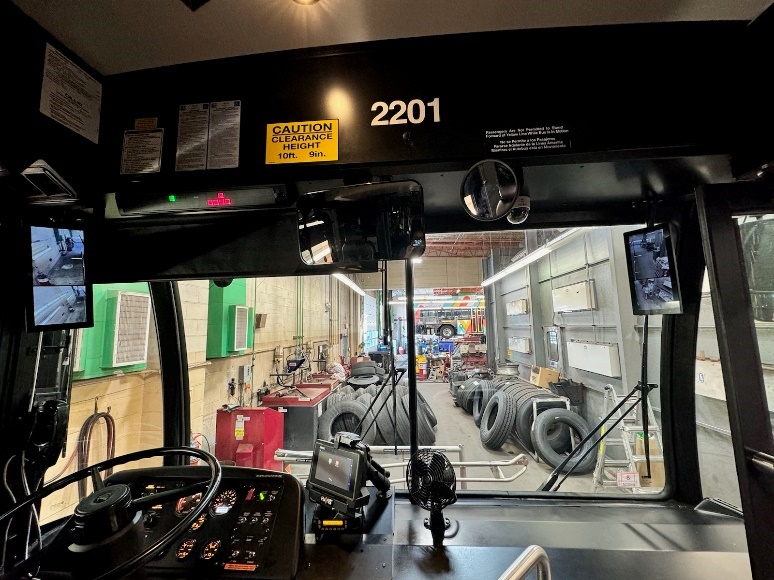REGIONAL – Those colorful buses that the Merrimack Valley Transit Authority (MeVa) runs in towns along the river are being equipped with digital cameras that someday may replace their mirrors.
Like the digital cameras on many new cars, MirrorEye is taking the place of traditional rear- and side-mirrors.
“MeVa was the first transit authority in the country to test the MirrorEye camera monitoring system in Gillig BRT buses, and the only operator in Massachusetts to install it in any vehicles,” the MeVa advisory board was told last week.
The board, made up of representatives of cities from Lawrence to Rowley, got to see the MirrorEye on Bus #2201. The MirrorEye displays are on both sides of the bus.
The system uses high-definition cameras and interior monitors to eliminate blind spots and prevent possible turn collisions with cars, pedestrians and stationary objects like light posts and curbs.
The system provides normal rearview and wide-angle views, as well as passenger-side views, in the same housing.
“It is because of our holding safety as our top priority that we are testing the MirrorEye system now,” Berger wrote.
MirrorEye is also equipped with self-cleaning and defrosting functions, which enhance vision quality during rain, snow or ice, while an advanced image rendering system also blocks sunlight reflections and superior infrared-enhanced night vision improves visibility after dark. Initial tests in service have been very favorable, MeVa said.
“All the drivers that have had a chance to utilize it have been very impressed with it and have recommended installing in more buses,” MeVa Director Noah Berger told his board..
After further demonstration, the plan is to install the MirrorEye on the 31 newer Gillig BRT-style buses.
On other vehicles, the MirrorEye also saves fuel and emissions by up to 5 percent because it removes the exterior mirrors that create air drag.
But Berger said MeVa is not confident enough yet in the MirrorEye equipment to remove all the exterior mirrors.
“The reason we looked at the system is simply our being proactive with making sure we are maximizing safety. Like any vehicle, buses have blind spots. We obviously operate with pedestrians and passengers often walking near the bus, so closing blind spots is of particular benefit for a transit vehicle,” Berger wrote.
Berger also announced at the board meeting that the transit authority’s van service has reached a new safety record in the last five months with no accident. That is the longest accident-free stretch in its history, Berger said.
MeVa rewarded the drivers with lunch last week.
Unfortunately, the drivers for the full-size buses could not make the same accident-free claim. A bus was hit head-on while driving 20 passengers on state Rte. 10
“Fortunately, the 20 passengers and our driver were ok. Three passengers were taken to the hospital as a precaution, but released. The driver of the vehicle that hit us was in more serios condition and taken to Portsmouth Hospital by ambulance,” Berger emailed.
After reviewing the video, Berger wrote that he was “very proud of how our driver reacted—as he was trained, he made sure that all his passengers were safe and was the model professional during a very difficult time.”
The driver attributed his reaction to the accident to the training MeVa provided.
Berger wrote, “The reality is that all of our drivers have a very difficult job to do and conduct their duties with the utmost skill and professionalism.”
Bye Bye Bus Blind Spots
Tuesday May 14, 2024

MeVa MirrorEye



